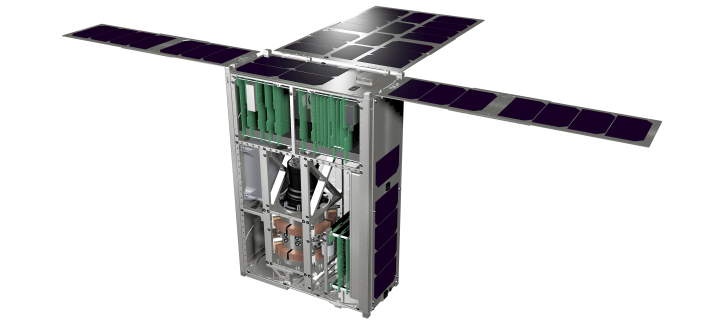Under a project called Cold Atom Space Payload (CASPA), Teledyne e2v is leading the development of a nanosatellite (30 x 20 x 10 cm) which aims to demonstrate cold atom technology in space. In addition to leading the programme, Teledyne e2v are developing a space flight ready variant of a cold atom chamber subsystem that will begin space qualification as part of the satellite, later this year.
New developments in quantum technology have resulted in the ability to cool atoms close to absolute zero by using lasers. At these temperatures laboratory, experiments have shown that these cold atoms can be used as ultra-sensitive sensors for measuring gravity. This technology has applications both on the ground and in Space. There is currently a technology readiness barrier preventing this technology from being adopted in Space, this has been identified by the European Space Agency (ESA) who have this technology on their development roadmap. Teledyne e2v is addressing the technology readiness level barrier through the CASPA programme, which will be the first demonstration of cold atoms on a free-flying satellite.
The extreme sensitivity brought by cold atom sensors could provide the ability to finely monitor the movement of mass within Earth systems bringing benefits to multiple applications, including polar ice mass monitoring, ocean currents, and sea level monitoring along with water table monitoring for flood and drought prediction.
With a key focus on commercialization, Teledyne e2v has invested in a dedicated production facility at their Chelmsford site, the company has since taken a leading role in the £270M National Quantum Technology Programme invested by the UK Government over five years.
The company’s Quantum Group is part of a truly collaborative UK academic and industrial expertise working with organizations such as:
- University of Birmingham
- XCAM
- Clyde Space
- Gooch & Housego
- Covesion
- University of Southampton
Current development streams at Chelmsford include gravity sensing, precision timing, and space hardware development for Earth Observation (EO) with potential applications in detecting and monitoring underground resources from Earth or Space, as well as navigation, synchronization of distributed resources and networks, and Global Navigation Satellite System (GNSS resilience).
Further updates concerning the CASPA development programme are planned to be made in the coming months.
As well as developing ground-based gravity sensors and precision timing instruments, the Quantum group in Teledyne e2v has also received orders for cold atom chamber subsystems that will be used for laboratory-based quantum experiments.























